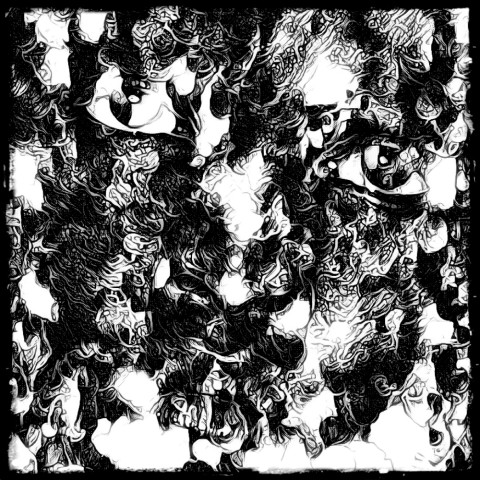Trigger warning: This story contains descriptions of extreme violence.
_________________
Consider a case of a man who sets his five-year-old niece ablaze.
The five-year-old niece, her name is Ukamaka. She has plump cheeks with skin the colour of a kola nut, her hair cropped low with a slant parting across the front hairline. She likes to run along the street, past the woman who sells fresh tomatoes and peppers and calls Ukamaka ọmọ mi, past the mill that reeks of sweat, sawdust, and dung, past the unpainted bungalow where her female friends once invited her to a play but Ukamaka realizes that a little girl like her should never partake in such sort of child-adult play.
It is Sunday afternoon. The street is empty. Excepting the three Jehovah Witnesses who trudge from door to door, knocking on tar-painted gates, their lips full with the word of God. And a naked child who rolls a tyre down the street beside the open gutter. Ukamaka is running towards the pharmacy store to buy some antibiotics for her ailing mother. By the time she returns—after the Jehovah Witnesses dust their feet in places where they had been rejected, after the naked child bruises his left knee and runs home, crying—Ukamaka’s mother is lifeless, stiff, on the worn earth-brown cushion. Ukamaka calls her mother by her name. She shouts, tugs at her mother’s breasts, places her right ear on her mother’s chest. No sound, no heartbeat, nothing. Ukamaka screams. Her mother has left her alone in this world, the same way her father did a year ago, but, in his case, a train had squashed him into scatterings of fat, flesh, and blood.
She sits by her mother’s head, sobbing, whispering stories, when her uncle walks in. This man, we shall call him Uncle Arinze. After Uncle Arinze enters the room, more faces emerge. They cry, shout, pound their chests, complain to God for being so cruel and selfish, He never for once asked Himself how on earth little Ukamaka will survive this world.
She lets them shove her around. From mortuary to funeral mass to a new home with Uncle Arinze, an unmarried man who lives six streets away from Ukamaka’s home. Uncle Arinze allows Ukamaka to play with the children on the street. Some weeks later, Ukamaka begins to shit anywhere she can find. Bushes, dark street corners, school backyard, abandoned vehicles. Anywhere but Uncle Arinze’s home. The first time she gets caught is at her friend’s mother’s barn. When the woman reports the girl to her uncle, he says he will talk some sense into her. On the night of the same day, Ukamaka receives a good beating from Uncle Arinze. Uncle Arinze buys a twenty-page notebook, tells Ukamaka to fill each line with: “I will not poo-poo in people’s houses.”
Ukamaka knows fully well how to use a flush toilet without supervision. Yet, ever since she lost her parents, she finds a certain kind of joy in shitting in public places—the gentle breeze caressing her buttocks, her spirits unfettered by the walls of a room. No one sees the scars inflicted upon her by Uncle Arinze. No one cares to ask after her.
The second time, Ukamaka shits in a gutter, and when she is apprehended by the local touts, they drag her by her ears to meet Uncle Arinze. The touts demand five thousand naira as fine from Uncle Arinze for Ukamaka’s behavior. Uncle Arinze falls on his knees, saying, “I am only a school teacher. I teach in a public primary school. The government does not pay us well enough.” The boys leave Ukamaka in the hands of Uncle Arinze. That night, Uncle Arinze heats up an iron bar on a kerosene stove and presses it into Ukamaka’s back. The girl screams and screams.
A week later, she shits in an empty class at school. A teacher catches her, says she will report her to her guardian. Ukamaka begs for forgiveness, crying, both knees scraping the ground as she follows the teacher.
The news reaches Uncle Arinze’s ears. He thanks the teacher.
He ambles into his room, emerges with a thin cane, and whips Ukamaka.
Ukamaka is crying, pleading. She says she will be of good behavior. She clutches to Uncle Arinze’s leg as the man drags her from bedroom to sitting room to the empty front yard. Uncle Arinze has had enough. He ties her with a hessian rope around an avocado tree, drenches her with fuel. The little girl is choking, eyes bloodshot, her body pressing forward. Uncle Arinze lights a matchstick, sends the girl burning. Police arrive an hour later.
Now, Uncle Arinze is weepy. He says to the police, “I did not mean to do it. It was the work of the devil,” as he is bounded off to a van, black smoke rising behind him.



 The core workshop of SmokeLong Fitness is all in writing, so you can take part from anywhere at anytime. We are excited about creating a supportive, consistent and structured environment for flash writers to work on their craft in a community. We are thrilled and proud to say that our workshop participants have won, placed, or been listed in every major flash competition. Community works.
The core workshop of SmokeLong Fitness is all in writing, so you can take part from anywhere at anytime. We are excited about creating a supportive, consistent and structured environment for flash writers to work on their craft in a community. We are thrilled and proud to say that our workshop participants have won, placed, or been listed in every major flash competition. Community works.